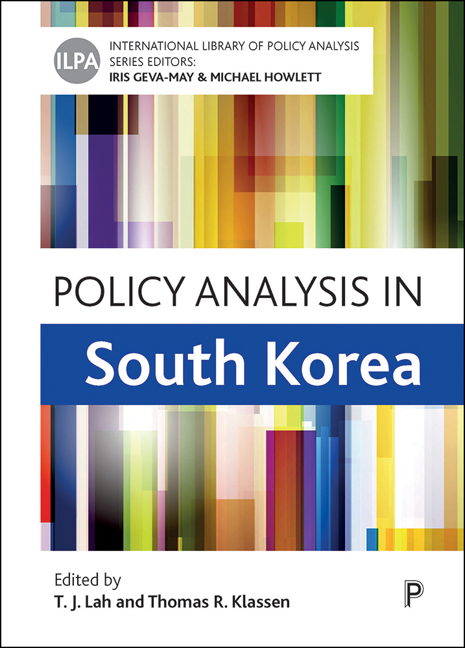Book contents
- Frontmatter
- Dedication
- Contents
- List of figures, tables and boxes
- List of abbreviations
- Notes on contributors
- Acknowledgements
- Editors’ introduction to the series
- Foreword
- Part One Overview of policy analysis in Korea
- Part Two Policy analysis by governments
- Part Three Committees, consultants, media, public inquiries and public opinion
- Part Four Parties, interest groups and advocacy-based policy analysis
- Part Five Academia, research institutes and policy analysis
- Index
eleven - National Assembly committees and support organisations
Published online by Cambridge University Press: 18 January 2024
- Frontmatter
- Dedication
- Contents
- List of figures, tables and boxes
- List of abbreviations
- Notes on contributors
- Acknowledgements
- Editors’ introduction to the series
- Foreword
- Part One Overview of policy analysis in Korea
- Part Two Policy analysis by governments
- Part Three Committees, consultants, media, public inquiries and public opinion
- Part Four Parties, interest groups and advocacy-based policy analysis
- Part Five Academia, research institutes and policy analysis
- Index
Summary
Introduction
In representative democracies, parliamentary assemblies perform the function of deliberating on and determining national policies in the form of legislation or budgets. The committee system is the system that performs the functions of assemblies most effectively and efficiently. As societies continue to grow in complexity, it is common for not only the initiation and examination of substantive legislation but also supervision of the executive to be performed by standing committees (Davidson and Olseszeck, 1996, pp 195– 200; Seo et al, 2012, p 188). Woodrow Wilson once described the decision-making role of committees as ‘dim dungeons of silence’ (Wilson, 1885, p 69; Curry, 2016, p 2). Committees have been responsible for performing practical reviews on legislative and policy issues from the 1948 Constitutional Assembly all the way through to the 20th National Assembly. Currently, the 20th National Assembly consists of 17 standing committees and two special standing committees.
These committees have the authority to propose and deliberate on legislative bills, as well as the gatekeeping rights to either discard bills or choose not to report them to a plenary session. This means that even though a plenary session of the National Assembly holds the final hearing on bills, this is merely a formality, and the standing committees actually determine the fate of the bill (Jeon and Park, 2012). In fact, for the 19th National Assembly (2012– 16), a total of 17,822 bills were submitted, of which 17,821 were processed by standing committees. Of the bills processed, 7,631 were approved and referred to a plenary session, of which 7,429 were approved and enacted into law. The rate at which standing committees approve bills is 42.8 per cent, while the figure for plenary sessions is 97.4 per cent. In other words, most of the bills that passed the standing committees were also passed at a plenary session, and most of the bills that were repealed at the end of the term were not passed by the standing committees.
In the sense that committees lie at the heart of assemblies, this chapter deals with the committee system of the National Assembly of Korea. This begins with a review of the formation and status of committees, followed by a discussion of their powers and functions. This discussion will focus on the roles of standing committees that include subcommittees, and cover the examination of bills and reviews of budgets and petitions.
- Type
- Chapter
- Information
- Policy Analysis in South Korea , pp. 153 - 174Publisher: Bristol University PressPrint publication year: 2023



